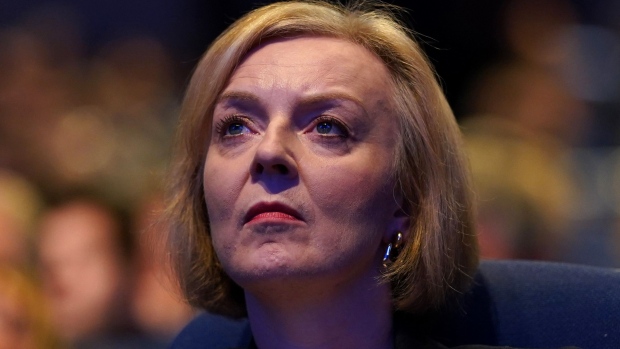Oct 4, 2022
Truss Yet to Decide on UK Benefits as Fresh Row Looms With MPs
, Bloomberg News

(Bloomberg) --
Liz Truss said she has yet to decide whether welfare payments in the UK should rise in line with inflation, an issue that threatens to spark another bitter dispute with disgruntled Conservative members of Parliament.
In interviews broadcast Tuesday, the new prime minister again refused to commit to a pledge made made by the government under her predecessor, Boris Johnson. She also drew a distinction between state pension recipients, who she said will get an inflation-matching boost, and those on welfare benefits, who she said could adapt more easily to cost-of-living pressures.
Read more: Some of Truss’s Top Team Say Her UK Project May Already Be Over
“When people are on a fixed income, when they are pensioners, it is quite hard to adjust,” Truss told LBC Radio on Tuesday. “It’s a different situation for people who are in the position to be able to work.”
The decision has the potential to explode into another major political headache for Truss, with many senior MPs -- including members of her own Cabinet -- saying it would be unfair to effectively reduce welfare payments when people are already facing a major squeeze on living standards.
“We’re not about trying to help people with one hand and take it away with another,” Leader of the House of Commons Penny Mordaunt told Times Radio.
Tory Strife
The issue feeds directly into the internal Tory politics that forced Truss into a U-turn Monday on a signature part of her economic plan: to abolish the top rate of income tax for Britain’s highest earners. As support for the Conservatives slumped in opinion polls, MPs complained the policy prioritized the wealthiest over people on lower incomes.
That’s emboldened her critics, and even members of her Cabinet privately say she will now struggle to push through contentious parts of her economic revolution for Britain -- deregulation aimed at boosting economic growth, alongside a swathe of tax cuts -- because she is already too weakened.
It’s a remarkable turnaround for a premier still in her first month in office.
Rebel Moves
In the LBC interview, Truss didn’t rule out reversing course on other parts of her program, including her plans to end a cap on bankers’ bonuses. When asked if austerity measures were on the way to curb public spending, she said there would be a focus on fiscal responsibility.
Michael Gove, the former minister who has become an unofficial recruiting sergeant for unhappy Conservatives, told Times Radio he would “need a lot of persuading” to back the government on welfare benefits if they are not raised in line with inflation. Gove was one of the most high-profile critics of the plan to shelve the top rate of income tax, which Truss eventually had to scrap.
“We have to be a government that is a compassionate Conservative government, and that isn’t just about growing the economy, it’s about growing society too,” Conservative MP Robert Halfon told Bloomberg. “I believe in trickle-up economics as much as some of them might believe in trickle-down economics, because I believe you have to invest in those who have the least.”
Truss acknowledged she needs to “win over hearts and minds” among her MPs, in the face of mounting criticism. She’s due to give her main address to the party’s annual conference on Wednesday. When asked about her tax-cut package, Truss suggested reversing directions plays in her favor.
Course Reversal
“What the last 24 hours has shown is that I’m somebody who has a clear plan, has a clear direction, but is prepared to listen and is prepared to do things differently, if that is what is required,” Truss told the BBC in a separately.
But there are growing signs that Truss is already boxed in, without the authority to secure the compromises she needs among different party factions to see her ideas through. In that context, the row over welfare payments may be simply one of many.
As well as Mordaunt, Cabinet minister Robert Buckland also hinted in an interview on Times Radio that he would push for welfare increases in line with inflation.
“I’ve always supported -- whether it’s pensions, whether it’s our welfare system -- keeping pace with inflation,” Mordaunt said, a comment that will pile pressure on Truss. “It makes sense to do so. That’s what I voted for before.”
(Updates with Halfon comment in 11th paragraph, Buckland hint in penutimate)
©2022 Bloomberg L.P.






